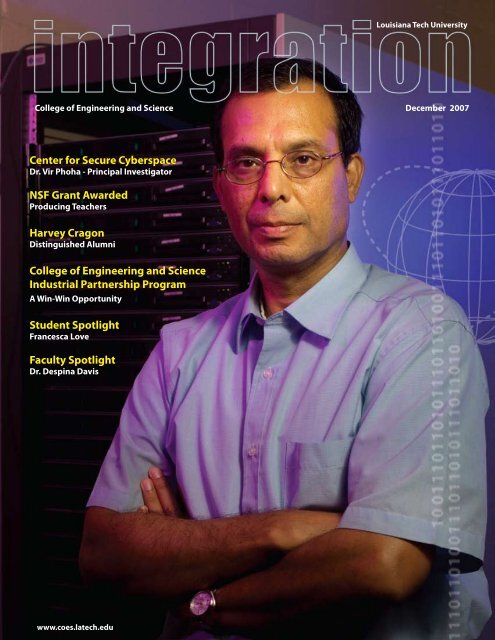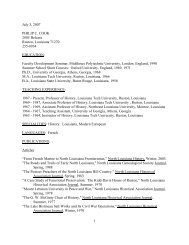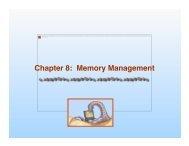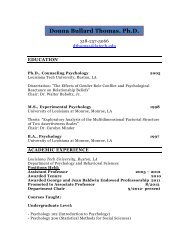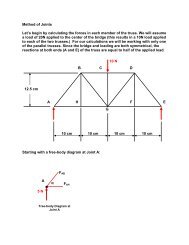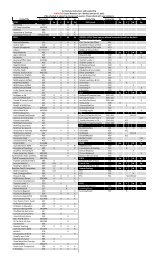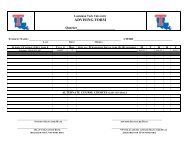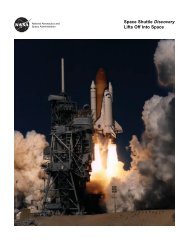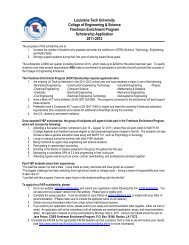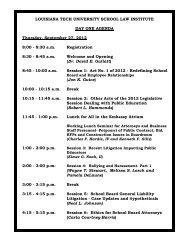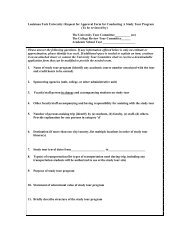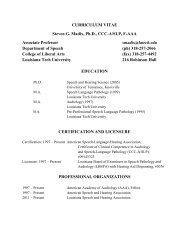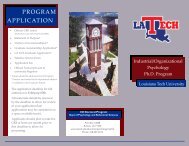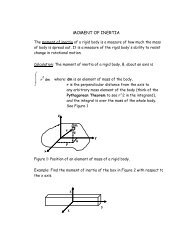Center for Secure Cyberspace - Louisiana Tech University
Center for Secure Cyberspace - Louisiana Tech University
Center for Secure Cyberspace - Louisiana Tech University
You also want an ePaper? Increase the reach of your titles
YUMPU automatically turns print PDFs into web optimized ePapers that Google loves.
<strong>Louisiana</strong> <strong>Tech</strong> <strong>University</strong>College of Engineering and Science December 2007<strong>Center</strong> <strong>for</strong> <strong>Secure</strong> <strong>Cyberspace</strong>Dr. Vir Phoha - Principal InvestigatorNSF Grant AwardedProducing TeachersHarvey CragonDistinguished AlumniCollege of Engineering and ScienceIndustrial Partnership ProgramA Win-Win OpportunityStudent SpotlightFrancesca LoveFaculty SpotlightDr. Despina Daviswww.coes.latech.edu
<strong>Center</strong> <strong>for</strong> <strong>Secure</strong> <strong>Cyberspace</strong><strong>Louisiana</strong> <strong>Tech</strong> <strong>University</strong> and <strong>Louisiana</strong> State <strong>University</strong>have joined <strong>for</strong>ces in the fight <strong>for</strong> a more securecyberspace. Led by one of <strong>Tech</strong>’s computer scienceprofessors, Dr. Vir Phoha, the team of eight researchersin the fields of computer science and electrical engineeringis gearing up <strong>for</strong> five years of intensive research andimpressive goals.In June of this year, the <strong>Louisiana</strong> Board of Regentsawarded over $3 million in funding to <strong>Tech</strong> and LSU tosupport five years of research in this new and expandingfield of secure cyberspace. <strong>Tech</strong> is housing the <strong>Center</strong><strong>for</strong> <strong>Secure</strong> <strong>Cyberspace</strong>, which will be the venue to turnresearch into foundations and relationships benefitingnot only north <strong>Louisiana</strong>, but also the nation and theworld.Universities aren’t the only ones looking toward thefuture of cyberspace. This year the U.S. Air Force hasannounced that Barksdale Air Force Base, just 70 milesfrom <strong>Tech</strong>, is the home <strong>for</strong> the newly developed AirForce Cyber Command <strong>Center</strong> (AFCyber). This <strong>Center</strong>is focused on protecting the safety of our nation’sshare of cyberspace, from the home front to the battlelines. The CSC will play a big role in providing research<strong>for</strong> the Air Force, while building strategic collaborativerelationships with AFCyber and between national andinternational academic and industrial partners.“The project will achieve the next level of convergence in thetechnologies that interact directly with the physical world andwith humans in dynamic and uncertain environments, cognizantof dynamic goals and the evolving physics, seamlesslyspanning time and space to monitor change, and collaboratingwith humans to actuate purposeful distributed response.”Vir PhohaThe members of the CSC plan to change the face ofresearch in this field, developing core research foundationsin evolvable sensor hardware and software andcorresponding trans<strong>for</strong>mational in<strong>for</strong>mation technologies<strong>for</strong> the early prediction, detection, and control of anomalousbehavior in cyberspace. All of this will be donein the world-class multi-institutional, multi-disciplinarycenter of excellence being developed at <strong>Tech</strong>.Research areas such as dynamic network <strong>for</strong>mulation,secure in<strong>for</strong>mation dissemination, data fusion and predictionof disaster precursors, and visualization and validationwill be the focus of the team over the coming years.Support <strong>for</strong> the CSC is strong, including such centersas <strong>Tech</strong>’s <strong>Center</strong> <strong>for</strong> Entrepreneurship and In<strong>for</strong>mation<strong>Tech</strong>nology (CEnIT), Enterprise <strong>Center</strong>, and <strong>Tech</strong>nologyBusiness Development <strong>Center</strong> (TBDC) and LSU’s<strong>Louisiana</strong> Business and <strong>Tech</strong>nology <strong>Center</strong>.Although the field of cyberspace research and securityis ever-changing, <strong>Tech</strong> plans to be on the <strong>for</strong>efront,paving a new cyber-road toward the advancement of ournation’s security.Dr. Bruce Willson, along with Harvey Cragon, prepare toplace Harvey’s plaque on the Distinguished Alumni Board.Distinguished Alumnus HonoredThe College of Engineering and Science has namedHarvey Cragon as its distinguished alumnus. A 1950graduate of <strong>Louisiana</strong> <strong>Tech</strong> in electrical engineering,he also pursued studies at UCLA and SMU. He servedin the U.S. Army and subsequently went to work <strong>for</strong>Southern Bell and Hughes Aircraft be<strong>for</strong>e joining TexasInstruments in 1958. He was principal architect of theTI Advanced Scientific Computer, developed during1966-71. At the time of its completion, it had the world’sgreatest processing capability, and is widely referencedas the landmark in high-speed computer design. Healso designed and assisted in the construction of thefirst integrated circuit computer that used semiconductormemory, another first, in addition to countless otherdesigns and innovations in microcomputers.In 1984, he left Texas Instruments to pursue a secondcareer, named to the Ernest Cocknell, Jr. CentennialEngineering Chair in the Department of Electrical andComputer Engineering at the <strong>University</strong> of Texas atAustin. His service there was completed in 1999. Today,Harvey is retired and working on a book about computersthat ran submarines during World War II.
National Science Foundation Grand awarded<strong>Louisiana</strong> <strong>Tech</strong> <strong>University</strong> has been awarded a Noycescholarship grant from the National Science Foundationto recruit Science, <strong>Tech</strong>nology, Engineering, and Mathematics(STEM) graduates into K-12 teaching fields.This project, entitled STEM-Plus, reflects a collaborativepartnership between the College of Engineering andScience and the College of Education. The NationalScience Foundation has provided over $730,000 in funding<strong>for</strong> this project, most of which will be awarded asscholarships to participants in the program. The grantproposal team consists of Dr. Galen E. Turner (PrincipalInvestigator and Maxfield Professor of Mathematicsand Statistics), Dr. Connie LaBorde (Associate Dean ofthe College of Education), Dr. Dawn Basinger (AssistantProfessor of Curriculum, Instruction, and Leadership),Dr. James D. Nelson (Associate Dean of the College ofEngineering & Science), and Dr. Kelly B. Crittenden (AssistantProfessor of Mechanical Engineering).STEM-Plus Scholars, recruited from both undergraduatemajors and current professionals with a degreein science, technology, engineering or mathematics, willearn the Master of Arts in Teaching and will becomecertified to teach in <strong>Louisiana</strong>. Undergraduates in theCollege of Engineering and Science will integrate up to12 credit hours of graduate education courses duringthe senior year of their baccalaureate program, whereasprofessionals with a degree from one of the STEM disciplineswill earn the Master of Arts in Teaching in oneyear. The program builds on the integrated approachesthat have proven successful in the College of Engineeringand Science. Targeting key <strong>Louisiana</strong> schools withsignificant shortages in science and mathematics faculty,this program aims to strengthen the faculty supportinfrastructure so that long-term outcomes are achievedwell beyond the end of National Science Foundationfunding. In short, STEM-Plus establishes the mechanismand incentives to integrate the Master of Arts inTeaching into baccalaureate programs <strong>for</strong> the first timeat <strong>Louisiana</strong> <strong>Tech</strong>.The STEM-Plus scholarship program will help create moremath and science teachers in <strong>Louisiana</strong>.College of Engineering and ScienceIndustrial Partnership ProgramFor over 100 years the College of Engineering andScience has provided highly qualified engineering andscience graduates who possessed outstanding technicalability along with the character traits of: Integrity,Tolerance, Respect, Devotion, Honesty and Dignity.These engineers and scientists have contributed to thesuccess of the companies they went to work <strong>for</strong> and, asa result, have brought great honor and recognition toour College. A new program in the College now offers agenuine partnership between education and industry, atrue “win-win” synergy. It is the College of Engineeringand Science Industrial Partnership Program or COESIP.The market <strong>for</strong> hiring new engineers is presently tighterthan in many years and according to both hard dataand anecdotal reports this trend is expected to continue.Companies must identify, cultivate and hire the very bestcandidates to fill needed positions. COESIP will helpthem do that. COESIP helps a company identify potentialcandidates in their sophomore, junior and senioryears. We then help facilitate interaction between thesestudents and the company’s human resources staff. Wewill also give the company exposure to our students interms of professional presentations, name and logo displaysin our building, company web links on our web siteand video feature opportunities. The industry partner’sfinancial buy-in to COESIP provides us with neededannual funds to help us continue producing outstandinggraduates. These funds are used by the College toprovide the student with up-to-date laboratories, outstandingprofessors, and teaching spaces that encouragethe student to give his or her very best! If you or yourcompany would like to explore the program furtherplease contact Dr. Bruce Willson, Assistant Dean <strong>for</strong>Development at 318-257-4649 or by his e-mail address:willson@latech.edu.
Student SpotlightFrancesca Love is a seniorcivil engineering major fromBivins, Texas. Fran is not onlya solid student, but also veryactive in campus life. Shecurrently serves as the vicepresident of the student chapterof the National Societyof Black Engineers (NSBE)as well as the regional secretaryof NSBE. Fran is alsosigns coordinator <strong>for</strong> the student chapter of the Societyof Women Engineers (SWE), a member of the studentchapter of the American Society of Civil Engineers(ASCE), and was recently nominated to <strong>Louisiana</strong> <strong>Tech</strong>’shomecoming court. When not actively engaged in oneof these organizations or her studies, she can be foundcheering on the Bulldogs as a member of the <strong>Tech</strong> SmallCo-Ed Cheerleader Team.From the first time she stepped on campus, Fran says<strong>Louisiana</strong> <strong>Tech</strong> felt like home. She attributes much ofher early success as a student to the support she receivedfrom the Society of Women Engineers (SWE). SWEprovided the study groups and encouragement necessaryto get her over some of the early obstacles she facedas a young engineering student. Ms. Alicia Boudreaux,Dr. Mark Barker and Dr. Tom Straughan have beeninstrumental to Fran’s academic success as well, servingas both mentors and role models who have inspired andchallenged her.Fran aspires to design bridges and roads, and theCollege of Engineering and Science is very <strong>for</strong>tunate tohave had a role in helping her to achieve her dream.Faculty SpotlightDr. Despina Davis was bornin March 1978 in Ploiesti,Romania and came to theUnited States to attend Texas<strong>Tech</strong> <strong>University</strong>, graduatingin 2002 with dual degrees inChemical Engineering andChemistry. In the fall of2002, she attended <strong>Louisiana</strong>State <strong>University</strong> to pursuegraduate work in chemicalengineering. She received her Master’s degree in ChemicalEngineering in May 2005 and her Ph.D. in Engineeringin May 2007. As a graduate student, Despina wasgiven the distinguished honor of being awarded a fellowshipwith the Integrative Graduate Education Researchand Training Program (IGERT), an interdisciplinaryprogram sponsored by the National Science Foundation.Less than one percent of engineering and science studentswho apply are accepted into the program. As a fellowin the IGERT program, she successfully participatedin many community service activities, presented researchat numerous conferences, and authored or co-authoredseveral publications.Her main area of interest and expertise lies in thedevelopment of nanowires, the eventual application ofwhich is the creation of more sensitive sensors that canread data stored in very compact hard drives. In 2004,Despina submitted a report of invention along withElizabeth J. Podlaha <strong>for</strong> “Electrodeposited MultilayeredNanotubes <strong>for</strong> Magnetic Sensing”. Here at <strong>Tech</strong>,Despina continues her research. She also works with<strong>Tech</strong>’s Office of Intellectual Property and Commercializationon additional patent opportunities.<strong>Louisiana</strong> <strong>Tech</strong> <strong>University</strong> | College of Engineering and ScienceOffice of Communications600 West Arizona StreetRuston, <strong>Louisiana</strong> 71272www.coes.latech.eduPRSRT STDNON-PROFITORGANIZATIONU.S. POSTAGEPAIDRUSTON, LAPERMIT NO. 104Director of CommunicationsDr. Bruce Willson Jr.willson@latech.eduBuilding Engineers and Scientists <strong>for</strong> TomorrowPassion to be the Best


